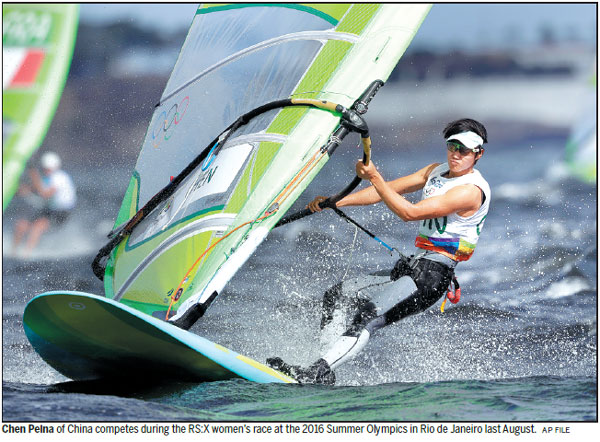Setting sail on a golden voyage
By Chen Xiangfeng in Yinchuan, Ningxia (China Daily) Updated: 2017-08-08 08:26China's Chen hopes experience can steer her to Tokyo 2020 glory
When Chen Peina received an invitation to attend the opening ceremony of a sailing tournament in Yinchuan, the capital city of Ningxia Hui autonomous region, a question lingered in her mind: How is an inland province able to host a national sailing event?
The world champion and Olympic silver medalist got her answer, though, when she arrived at the venue - Shahu Lake, a tourist resort that boasts a unique combination of wetlands and desert, and is currently hosting a four-day aquatic sports festival, ending on Wednesday.
"Sailing is still a small sport in China and it usually takes place in coastal cities," said Chen, who claimed silver in the women's RS: X at the Rio Olympics last year. "I did not expect to see a national sailing invitational tournament in an inland city.
"To me, it is an important step forward for the sport and it means sailing begins to spread to China's inland cities. I believe more young people will get to know the sport and get involved in it."
Chen, who was born in Shantou, a coastal city in Guangdong province, has fond memories of the last time she competed on a lake.
"It was 2006 in Jinji Lake in Suzhou city (Jiangsu province). It's a rare experience to compete on a lake. Shahu Lake is much bigger and offers a rare view of desert."
Shahu Lake and the surrounding area, also known as Sand Lake, boasts 45 square kilometers of water area and 2.5 sq km of desert.
"Sailing alongside a desert will be a special experience for athletes," Chen added. "I hope a sailing training center will be set up soon in Shahu and help foster future sailors for the national team.
"Sailing is a sport with vigor, fashion and passion. As long as a city has a large water area with proper weather conditions, sailing can be introduced to a young generation."
Chen will represent Guangdong at the National Games in Tianjin later this month before going to Tokyo next month for the world championships, also the venue for the 2020 Olympics - a major target for the 28-year-old.
"Compared to other athletes, I'm not that young anymore. I can't think too much about 2020. The only thing I can do is keep working hard - no pain, no gain. When you are ready physically and mentally, you can take your chances."
In a sport where experience counts more than athleticism, Chen has good reason to be confident.
She is also trying to improve by learning from overseas competitors, whose careers tend to be longer than their Chinese counterparts because of smarter training regimes. Charline Picon of France, who beat Chen to gold in Rio, is 32, for instance.
"Getting older and having more experience is a big edge in sailing," explained Chen. "That's why lots of top sailors in other countries are over 30 when they win world or Olympic titles.
"Scientific training and advanced medical support is of great significance to Chinese sailors. We have to train smarter and try to avoid injuries. An injury rather than age will kill a sailor's career."
A case in point is Chen's 29-year-old compatriot Xu Lijia, from Shanghai, who won a bronze medal in the women's Laser Radial class at the 2008 Beijing Olympics and gold in the same event at London 2012. However, a series of injuries have forced her to leave the sport indefinitely.
Chen complained the nation's closed-door training system has lagged behind, making athletes exhausted in body and mind.
"Mental fatigue is Chinese athletes' major problem. Years of training in remote bases ruins their passion and love of the sport.
"Hopefully such situations can be changed. Foreign sailors usually take a year's rest after a major tournament like the Olympics. They have their body and mind recharged and come back even stronger."
Here's hoping that's the case for Chen come Tokyo 2020.
chenxiangfeng@chinadaily.com.cn

- 'Cooperation is complementary'
- Worldwide manhunt nets 50th fugitive
- China-Japan meet seeks cooperation
- Agency ensuring natural gas supply
- Global manhunt sees China catch its 50th fugitive
- Call for 'Red Boat Spirit' a noble goal, official says
- China 'open to world' of foreign talent
- Free trade studies agreed on as Li meets with Canadian PM Trudeau
- Emojis on austerity rules from top anti-graft authority go viral
- Xi: All aboard internet express











